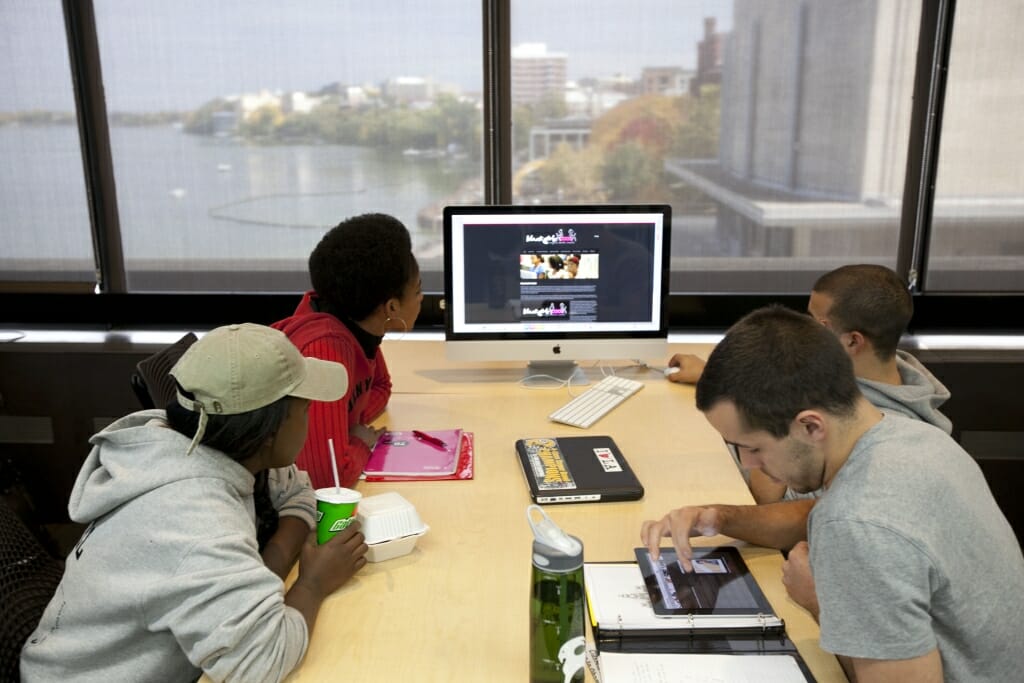UW Changes Lives: Libraries take steps to keep education affordable
From February through June, we will be highlighting the ways that UW–Madison changes lives for the better throughout the state of Wisconsin. March’s theme is Affordability and Excellence. Watch for more at #UWChangesLives on social media. And here’s how you can help.
Visit most university library websites and you’ll find an “Ask a Librarian” link that speaks volumes about the myriad ways libraries can help patrons.
On the surface, this may seem about in-the-moment assistance. A deeper look into the work of libraries reveals they are key advocates in supporting education affordability and success.
As the cost of higher education continues to rise, libraries are in a unique position to help minimize the impact on the wallets of students and faculty.
“Libraries have traditionally acquired unique materials, negotiated competitive prices for resources like journal subscriptions, or partnered with campus units to create innovative spaces,” says Doug Way, Associate University Librarian for Collections and Research Services at the University of Wisconsin–Madison. “However, our role in directly reducing the cost of classroom-related expenses is becoming more common and critical.”
Whether it’s through partnerships that enhance materials access or online platforms that reimagine instruction, more than ever, libraries find themselves in an increasingly important role in creating solutions to address the high cost of higher education.
Cost-savings can come in many forms. The UW–Madison Libraries partners with other Big Ten Academic Alliance institutions (BTAA) include large scale acquisitions programs that have saved the University more than $763,000 since 2017 alone. The Libraries’ partnership with the BTAA as well as UW System also means students and faculty have access to 115 million volumes of materials from across our partner institutions, thanks to UBorrow.
“The impact of working through consortia means more access to more materials for each campus,” notes Way. “This helps remove the burden of students and faculty footing the bill for potentially thousands of dollars for access to books, articles, or journal subscriptions, which can quickly become costly.”
Through actively supporting the creation of Open Education Resources (OER), sponsoring working groups through the Open Textbook Network, and creating an OER working group, the UW–Madison Libraries are able to advance affordable course content initiatives.
“OER has the potential to make a great impact,” says Way. “For example, take a high enrollment General Physics course with hundreds of students that requires a $165 textbook. Now make that book an openly accessible text through OER, and there’s a potential cost savings for students across campus of $189,000 each year.”
Libraries are stretching in other ways to remove cost burdens. The UW–Madison Libraries are innovators in discovery, coordinating experiences across a broad landscape of resources: catalogs, articles, databases, digital collections, and more. They break down barriers between resources, giving free access to literally a world of materials, in the stacks and beyond.
“In 2018, there were 6 million searches in our systems,” explains Lee Konrad, Associate University Librarian for Digital Strategy. “The discovery may start elsewhere, but leads to our resources.”
Online and blended learning is one of the key changes advancing higher education today. The Libraries are evolving in this area by offering micro-courses aimed at graduate students on topics such as copyright and research data management, videos for undergraduates on reading scholarly articles and academic integrity, and immersive experiences that allow students to actively search through online guided instruction.
If negotiating resource access and attending to emerging teaching and learning practices weren’t enough, libraries haven’t shied away from forging other high-impact opportunities that enhance student success and reduce costs.
UW-Madison Libraries help students navigate research, access free mentoring and tutoring services, take advantage of community building opportunities through free events and organizations, discover career paths, and explore leadership opportunities.
“Libraries can use our expertise to generate innovative solutions that create tremendously positive impacts on affordability and student success,” says Lisa Carter, Vice Provost for Libraries and University Librarian. “For those shouldering the costs associated with higher education, any financial relief they can find becomes priceless.”
Tags: libraries

